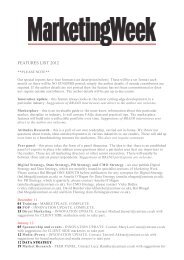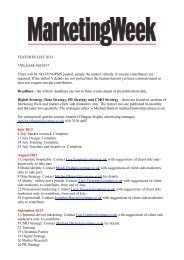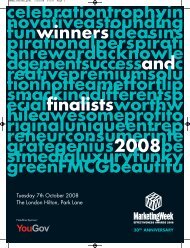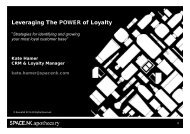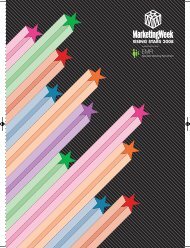Interactive Seven 2009 Supplement - Marketing Week
Interactive Seven 2009 Supplement - Marketing Week
Interactive Seven 2009 Supplement - Marketing Week
Create successful ePaper yourself
Turn your PDF publications into a flip-book with our unique Google optimized e-Paper software.
MWIB_260209_p011 19/2/09 17:13 Page 11<br />
INTERACTIVE SEARCH<br />
“As more companies<br />
seek a co-ordinated<br />
approach to their<br />
online marketing<br />
strategies, we expect<br />
increased demand<br />
for campaigns that<br />
integrate both paid<br />
and natural search<br />
strategies”<br />
Andrew Girdwood,<br />
Bigmouthmedia<br />
sion to scrap Best Practice Funding and launch the SearchWiki tool enabling<br />
its users to take control of their search results. Nigel Muir, managing director<br />
of independent search engine marketing agency DBD Media, says: “As<br />
the credit crunch turns into a fully-fledged recession, it is clear that... the<br />
year ahead for search marketing is going to be dictated by the economy.<br />
The impact of search marketing needs to be communicated through companies<br />
as a whole, and search marketers need to make their voices heard<br />
through detailed, tailored and accessible reporting. The inherent measurability<br />
of search campaigns, and online marketing as a whole, means<br />
that marketers can speak to board-level directors in their own language –<br />
with cold, hard data.”<br />
“Search marketers must demonstrate strong business understanding<br />
and apply this knowledge to ensure tight, strategic, search-marketing plans.<br />
This will ensure that all key words are effective, and that budget for paid<br />
search is placed as accurately as possible. Search marketers with insight<br />
into the marketing process as a whole and with strong business understanding<br />
will shine in these tough times.”<br />
Business boom<br />
Justin Taylor, interaction partner at specialists MEC Interaction, also<br />
says search will see an increase in business, but must face higher demand<br />
for results reporting. “Advertiser-led search, be it natural or paid, will<br />
continue to increase its market share for advertising dollars. Clients will<br />
require agencies to deliver deeper, more measurable results, focused on<br />
both actionable ROI and brand ROI. Key search players will experiment<br />
more with visually led search for commercial purposes. This is attractive<br />
to both advertisers and the likes of Google, who have seen their share<br />
price fall over 55% in the past six months. From an agency perspective,<br />
search will continue to feature heavily on the majority of media schedules,”<br />
he says.<br />
Search will begin to be used across multiple media channels. Mobile<br />
operators are agreeing deals with search engines to provide a default service,<br />
and offline campaigns are using text message numbers to convey their<br />
messages interactively. Search is being used as a market research tool, for<br />
consumers to do research, and for businesses to measure its effectiveness.<br />
Online research into consumer buying patterns is starting to inform<br />
offline campaigns too. Lewis says: “As economic pressure mounts, search<br />
engines will undoubtedly be looking to monetise more of their inventory.<br />
Depending on your view of both text and graphical contextual advertising,<br />
these represent big opportunities as the three players pull together<br />
their insights from different channels. The monetisation of video content<br />
through the use of text ads is potentially a long-term vision when you consider<br />
some of the current research and development, and the ability to<br />
search through audio content.”<br />
Rich experiences<br />
Ward says: “Search will become a richer experience for the consumer, with<br />
more images and video results. Marketers’ search-engine optimisation<br />
strategies will become more important than ever before, as marketers will<br />
need to rethink how they can optimise images and videos to help increase<br />
the ranking of their website. Users tend to combine their media choices.<br />
For instance in a TV ad break, they may be surfing the internet for information<br />
relating to their show. This presents a huge opportunity to engage<br />
with users in a more receptive state of mind.”<br />
The ability to reach an audience at the right time is important to maintain<br />
their attention and secure your ROI. With the internet full to the<br />
brim with potential search results, keyword-based search results can provide<br />
valuable insight into how users interact with brands. But, to ensure<br />
they are worth the cost, marketers should look to analytics to ensure the<br />
terms really reflect the brand and to identify the best ways to achieve maximum<br />
impact.<br />
Ed Lamb, digital director at Digital Tullo Marshall Warren, says: “Marketers<br />
who try to keep control of content about their brand spend a huge<br />
amount of time trying to police it and fail anyway. Those which are<br />
adaptable and react positively to all brand mentions will create greater<br />
brand affinity.”<br />
It is clear that as <strong>2009</strong> develops, the search arena is changing once again.<br />
The challenge for marketers now is deciding how to work with the many<br />
different search tools and devise new ways of maintaining consumer interest<br />
without isolating their core audience.<br />
<br />
<strong>Marketing</strong> <strong>Week</strong> <strong>Interactive</strong> 11



